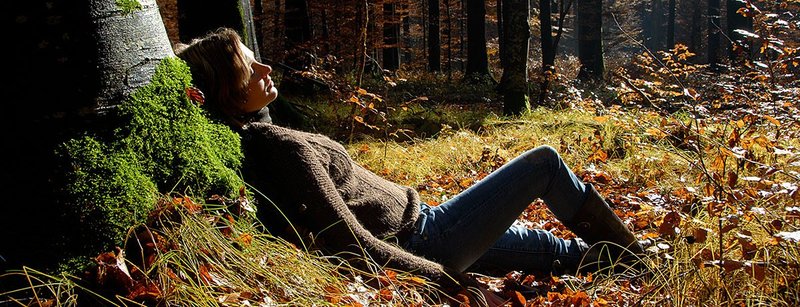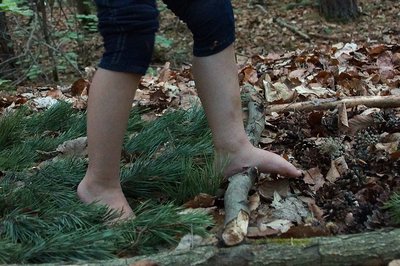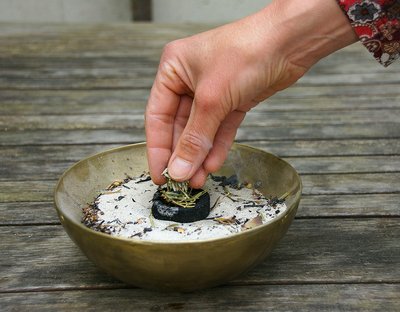Outdoor learning, especially when an immediate relationship from the early years is existing, decreases the concept of "Nature Deficit Disorder". Learning to be active and interact with natural elements as well as learning to feel good from this interaction, in an outdoor-learning-surrounding, has positive impacts on education.

Fig. 1: A "bath in the forest" is recreative for body and soul.
Positive effects of education in forests and forestpedagogy on human health
It is proven, that variation in the school yard with greenery promotes the physical activity of the pupils and more trees in schoolyard predict increased use and physical activity. Also natural environments at schools improve mental health and reduce behavioral disturbances.
In Forest schools children behave more harmoniously, they have lower levels of stress hormones, face less sun-exposure, have better motoric function, show better self-confidence and self-esteem and a better general well-being. The "classical" school performances seem to be better in forests schools too, so research indicated improved writing and maths skills, better cognitive and linguistic skills, more motivation and concentration, better reading; and better attendance. Other studies show, that confidence, social and communicative skills, motivation and concentration, understanding of and connectedness to nature as well as physical skills improved, when pupils were educated at forest schools. Individual learning processes are enhanced, and the regularity of the woodland visits strengthens familiarity and conscientiousness. Gained abilities can be transferred to the classroom and children especially learned to handle risks.
For Forest Kindergarten several studies showed that children educated in Forest Kindergartens are well prepared for school. Free, unstructured, and natural playing in the forest is of high importance because it is a continuous process of learning. Children can develop their own creative games according to their needs. This contact to nature helps to improve creativity, which is proved by studies. Children of Forest Kindergartens seem to act more creatively compared to indoor educational institutions. General diversity of the environment and seasonal changes of the forests and the use of forest elements continuously stimulate creativity. And there is an intensification of the bonding between children and adults in green spaces that can stimulate education and evoke a sense of safety among children.
Significant improvements in creativity, fantasy and gross motor abilities for children that were spending all week in Forest Kindergartens were found, but less for those who were just one day per week in the forests. Additionally, the relationship to nature is improved and self-confidence, as well as independence, is found to be enhanced. The immune system is strengthened by the contact with mud, soil, water and exposure to all weather conditions. This prevents classic and chronic diseases, and allergies. Social skills were improved. Children educated in "Waldkindergarden" achieved higher competences in fine motor skills as well in developing fantasy and creativity as in in social behavior, cooperating within teaching or motivation to interact, than pupils from regular kindergardens. The fact, that nearly all children that attend Forest Kindergartens do this on the explicit desire of their parents and the higher education of the pedagogues, compared to public nurseries, might distort findings of the previously mentioned studies.
The topic "Forests and Human Health" (FhH) – a challenge for Forestpedagogy (FP)
In Bavaria "Doctor Forest", a collection of Forestpedagogy-best-practice activities was published. Why is "Forests and health" so interesting? With Topics like sports, recreation or health are directly addressing many people´s personal needs, wishes, expectations, questions or sorrows. The topic "Forests and human health" is very well suitable to show correlations between these personal demands and the functions and services that sustainable forest management offers society. To communicate about this complex context, FP can provide a lot of offers and stimulations simplifying or illustrating facts and knowledge concerning positive impacts of forests on human health.
So "Doctor Forest" has also a high relevance for the dialogue of the forest sector with society: Looking at more and more different opinions, interests and expectations on forests and how they should be managed, the forest sector should focus more intensively on those benefits of forests which are not mainly concerning the support with renewable resources. Beneath the recreational and protection services of forests actually the impacts of forests on human health are getting worldwide more and more important – in the public perception as well as in dialogue with society. "Doctor Forest" is able to show the forester as an authentic and competent helper of forests. Therefore the personal contact within FP – activities is the most impressing and convincing method.
A lot of existing FP activities are suitable to show the importance of forests for human health. But of course it is necessary, that the forest pedagogue is able to explain this context. So the activities should be moderated or adapted to the FhH topic. Following some examples for these adaptions are outlined, structured into the six affected areas:
Human health and motion
The aspect of motion has an enormous impact on our health. A lot of diseases are caused by a lack of physical activity. More and more medical-therapy-offers from hospital or fitness-studios are carried out in forests. So FP-activities motivating the people to move, run or catch each other also can contribute to this means.
Human health and forest functions
Some of the so called forest-protection-functions or public-welfare-functions directly interconnect with human health. Forests are delivering healthy drinking-water, they can filter out emissions from cities or industry and they are reducing traffic-noise. These functions directly relate with many people needs and demands for recreation, silence and quiet, they hope to experience in the forest. A lot of FP-activities are dealing with the functions and services of forests and can easily focus on the topic FhH.
Human health and food & medicine
Forests offer us plenty of healthy food, such as honey, venison, mushrooms, herbs and a lot more. These goods are not only healthy, it is fun to search or collect them and an adventure to cook – if possible on an open fire - your own forest-diner with ingredients from the forest. Many FP-activities describe how – for example – making stick-bread, forest-mushroom-soup or forest-herb-salt-butter for the self-baked bread. But also a lot of medicine-products with healing-characteristics have their origin in the forest. FP-activities, like making your own arnica-salve or ethereal-pine-needle-oil are able to illustrate these impacts of forests on human health.
Human health and sensory experiences
FP is much more than just learning about forests. A lot of FP-activities are learning with all senses and focusing on hearing, smelling, tasting or feeling. Often this has to do with changing the perspective of viewing or perception. People can reduce stress and recover by learning with all senses.
Human health and meditative experiences
Some FP-activities are silent, meditative or just relaxing. They can be combined with reading or hearing poems or fables about forests, listening to a fairy-tale-teller or other meditative text. This may help people to distress and forget about sorrows or troubles.
Human health and creatively doing
Body, Soul and Psyche belongs together – so being in creative action, for example designing with material from nature and forests can intensify especially the mental and psychological wellbeing and so have positive effects on human health.



